War veterans abandoned in ‘no man’s land’
Veteran suicides have spiked and new investigations reveal the excruciating struggles ex-soldiers are forced into as they languish waiting for help.
SA News
Don't miss out on the headlines from SA News. Followed categories will be added to My News.
Duncan Percival waited five months to see a psychiatrist while battling mental health demons largely on his own in the midst of the COVID-19 pandemic.
“It’s like living in no-man’s land,” says Percival, 35, a veteran of the Afghanistan conflict from Adelaide's south, who suffers from Post Traumatic Stress Disorder (PTSD).
He is not alone.
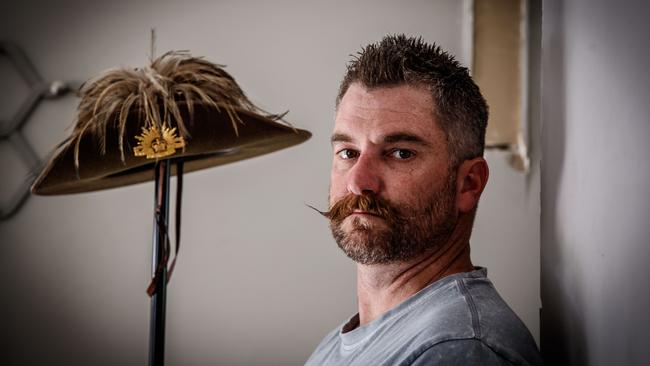
A special investigation – as part of the Sunday Mail and The Advertiser’s Let’s Talk: Our State of Mind campaign – reveals a desperate lack of psychiatrists and medical professionals to support returned veterans, amid an alarming rise in suicides and waiting times, exacerbated by the effects of the pandemic.
It comes as mental health experts and veteran advocates issue fresh warnings about the “deep impact” on returned soldiers of a report into war crime allegations involving Australian Special Forces, expected this week.
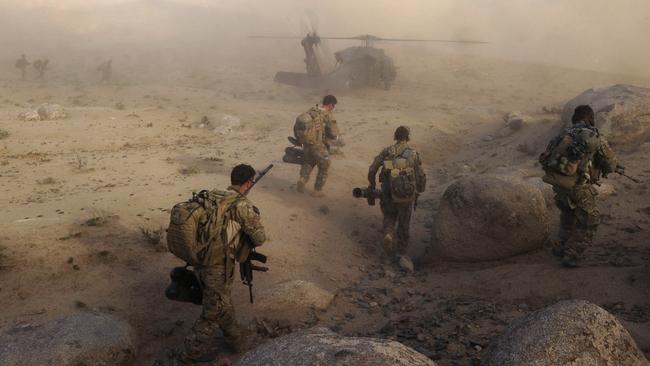
The Let’s Talk investigation today shows:
A WAIT of up to 164 days for Department of Veteran’s Affairs (DVA) claims to be processed in SA.
FIFTY three veterans have taken their lives so far this year across Australia – 32.5 per cent more than last year and the third highest amount in the last 20 years. The last known casualty was earlier this month.
AS at November 1 this year, more than 2900 claims from veterans in SA were being considered by the DVA.
NATIONALLY the department has received 155 per cent more claims in the past five years and is working to streamline the compensation claims process.
Percival was diagnosed with PTSD this year, seven years after leaving the Army in 2013, without a psychological evaluation.
The trooper’s main role was to watch over soldiers clearing IEDs (improvised explosive devises) planted by the Taliban in Afghanistan in 2010/11.
“I loved it – to be honest. I’d go back in a heartbeat,” he said.
But when he returned home he had difficulty sleeping, and suffered severe anxiety, depression, and aggression; symptoms later diagnosed as PTSD.
He lost his job as refrigeration mechanic job and, with the onset of the pandemic in April and the accompanying isolation and financial stress, went into a downward spiral.
“That’s when the drinking started. I started to fall off the grid. I shut down,” he said
But when he sought help in April, he was told he would have to wait until October.
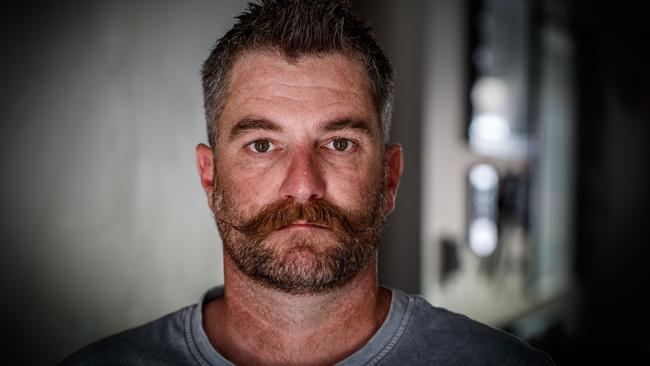
The long wait for help …
Adelaide University senior clinical lecturer and private psychiatrist Dr Nick Ford said this was common.
He is calling on colleagues around the state to help vulnerable veterans, some of whom are waiting until April next year for a first appointment.
“These men and women served our country – they protected us; we have a moral duty to help them,” said Dr Ford, who is part of a group of a dozen psychiatrists and psychologists treating ex-military in SA.
He said the DVA had been paying psychiatrists up to 30 per cent less for veteran clients, contributing to existing access barriers to services on top of increasing demand.
The Federal Government recently announced a $94.3 million “one-off fee increase’’ for mental health professionals treating veterans, including psychiatrists.
But Dr Ford said this would not be enough to reduce current waiting times across a sector overburdened even more by new and existing mental health clients impacted by the pandemic.
“There is a massive backlog to catch-up,” he said.
“After some 20 years of constant deployments it is disappointing not to see this planned for.”
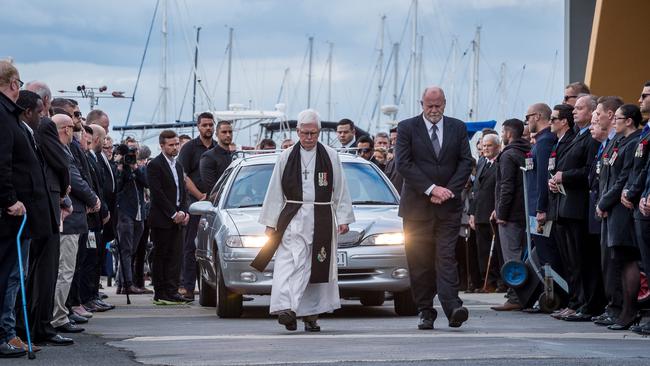
The rising suicide toll …
Army veteran and RSL advocate and welfare officer Scott Harris said 53 veterans had died this year to date, compared to 40 in 2019.
He has been compiling statistics on veteran suicides from police and coroner reports and veteran family contacts for the past five years dating back to the 1889 (Sudan Wars – 1885).
Mr Harris, from Queensland, began the unofficial count for veteran support group Warriors Return because he said Australian Institute of Health and Welfare data only included veterans who were DVA clients and discharged after 2001.
He said while not all veteran suicide was related to the DVA claim processes, every effort needed to be made to reduce waiting times for at-risk veterans.
The Department of Veteran Affairs says …
A DVA spokesman said there has been some reduction in claim times, while others have increased due to more claims received.
He said the government had provided $32 million to 2020/21 to increase DVA’s claims processing capacity, including more staff and resources.
“Claims are reviewed when they are first received and prioritised if a claimant is considered at risk,” he said.
“Indicators that a veteran may be at risk include homelessness, unemployment, complex comorbidity and/or financial hardship.”
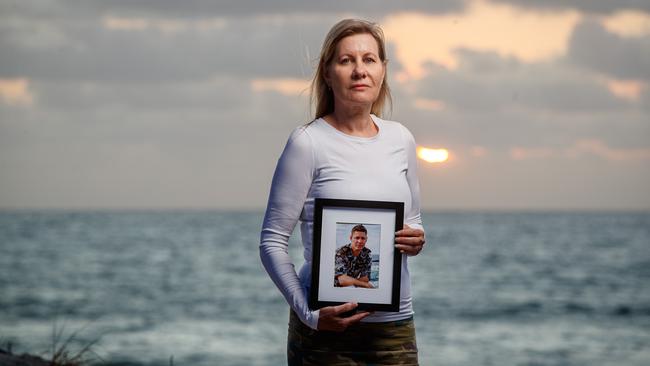
Lessons from past casualties …
Earlier this year the Victorian Coroner’s Court found systemic failures by the DVA to support veterans during claims processes contributed to decorated soldier Jesse Bird taking his own life in 2017.
Last year Naval petty officer David Finney took his own life after being told there was a wait to see a DVA psychiatrist.
His Adelaide mum Julie-Ann Finney is fighting for a Royal Commission into veteran suicide and the systematic failures that contribute to it.
The last word …
Percival said that, in the end, he got lucky – his potential seven-month wait was reduced to five and he knew a veteran advocate who’s been able to help him through tough times.
But he said the year had been enormously stressful, as he also had been forced to navigate a DVA injury claim, which was unlikely to be resolved until next year.
“More resources are needed to speed up the process because medicate and isolate is not a good thing,” he said.
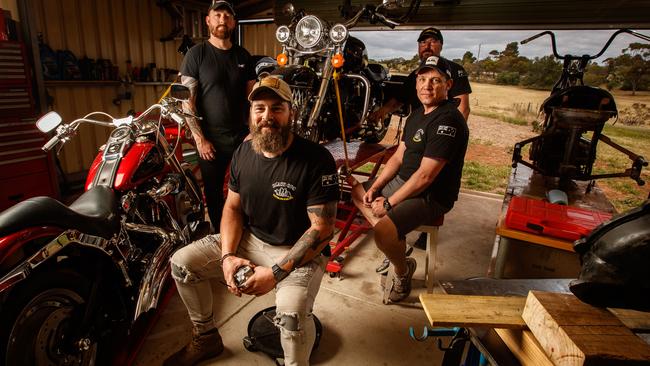
THE ADELAIDE GARAGE MENDING MINDS
In a garage north of Adelaide, veterans are working together to restore a donated Harley trike motorcycle.
It is missing parts, and some bodywork needs to be done, but the motor still looks good.
It’s not just motorbikes that are being rebuilt here.
“We fix people, too,” says ex-army engineer Jonny Spicer, 42.
In March last year, Mr Spicer set up the Gawler-based charity, Black Ops Veterans Garage, for post-traumatic stress disorder support.
The dad of four says he was frustrated by the lack of support groups for veterans north of the city that related to his decades of work in the army and motoring interests.
With veterans Tyson Potter and Jake Beers, the trio developed the concept of creating a safe, familiar place for ex-Defence, with a passion for mechanics to build resilience, and restore self-esteem, social connection and a sense of belonging.
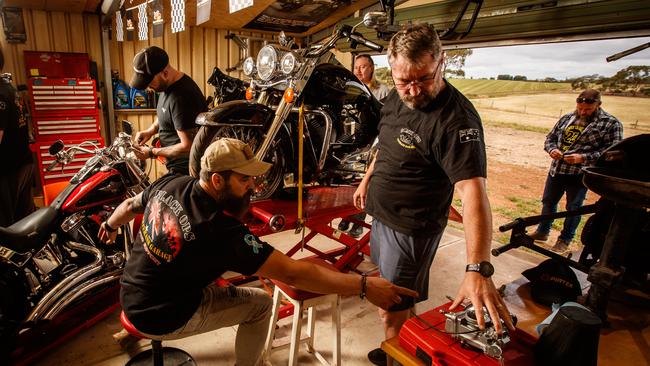
“Nothing is off limits in the garage,” said Mr Beers, 38, who spent 18 years in the Royal Australian Air Force.
“There is zero judgment. Knowing that I’m around people that have been through similar experiences makes it easier for myself and others to open up about confronting conversations that I feel only ex-military can really understand.”
The not-for-profit garage, funded entirely by donations, has a workshop, gym and provides advocacy support for navigating through the veterans’ claims process, and resources and referral to wellbeing and mental health services. “Veterans have always had to look after veterans – we have to look after each other,” Mr Potter, 35, said.
Details: Black Ops Veterans
Garage Facebook page or email blackops-Veteransgarage@hotmail.com





